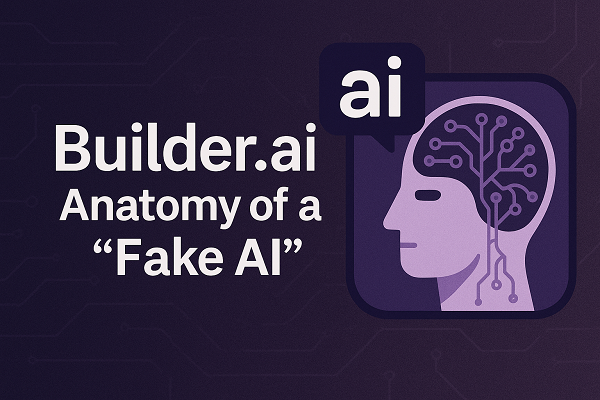A Billion-Dollar Dream Unravels
Once hailed as a game-changer in the world of software development, Builder.ai captured the imagination of investors and the tech media with its promise to make app creation as easy as ordering pizza. Backed by global giants like Microsoft and the Qatar Investment Authority, the London-based startup raised over $450 million and soared to a $1.5 billion valuation. But by mid-2025, the company was in bankruptcy, exposed for inflating sales, faking AI capabilities, and misleading investors on a massive scale. This investigation, drawing on leaked documents, whistleblower accounts, and public records, reveals how Builder.ai’s collapse is a cautionary tale for the entire artificial intelligence sector.
The Hype Machine: From Outsourcing Shop to AI Powerhouse
Founded in 2016 by Sachin Dev Duggal, Builder.ai (formerly Engineer.ai) began as a conventional software outsourcing firm. The company’s pivot to “AI-powered” app development came as the market for artificial intelligence exploded. Its pitch was simple but seductive: with Builder.ai’s platform and its “AI assistant” Natasha, anyone could build custom apps with little or no coding. The company claimed its AI could automate up to 80% of the software development process, slashing costs and timelines for clients.
This narrative proved irresistible to investors. Builder.ai raised over $450 million, including a $250 million round led by the Qatar Investment Authority and a strategic partnership with Microsoft, who planned to integrate Builder.ai’s tools with Azure. The startup’s branding and marketing leaned heavily on buzzwords like No-code, AI-first, and intelligent automation, positioning itself at the center of the generative AI boom.
The Reality: 700 Engineers, Not AI
Behind the scenes, the reality was starkly different. Instead of cutting-edge AI, Builder.ai’s platform relied on a vast workforce of 700 engineers in India who manually wrote code for client projects. Multiple former employees, whistleblowers, and industry analysts revealed that the so-called Natasha assistant was little more than a front-end interface for a traditional outsourcing operation. Most of the touted “AI automation” was performed by humans, not machines.
The Wall Street Journal and other outlets had raised red flags as early as 2019, noting that Builder.ai’s claims about AI-driven development were vastly overstated. Legal filings from a former executive alleged that the company misled investors by claiming apps were “80% built” by AI, when in fact the underlying technology was barely functional. As one industry observer put it, “There was no functioning AI backend. Most ‘automated’ operations were performed by low-cost human developers, who were instructed to mimic AI workflows”.
The Financial Mirage: Inflated Sales and Round-Tripping
While the technical deception was egregious, Builder.ai’s financial practices were even more alarming. According to documents reviewed by Bloomberg and corroborated by multiple sources, Builder.ai and Indian social media startup VerSe Innovation engaged in a practice known as “round-tripping”—billing each other for roughly the same amounts between 2021 and 2024 to artificially inflate sales figures. In many cases, no real products or services were exchanged, but the transactions allowed Builder.ai to present revenue numbers to investors that were overstated by more than 300% at their peak.
For example, Builder.ai’s reported 2024 sales of $220 million were later revised down to just $55 million, and 2023’s $180 million shrank to $45 million after an independent audit. These revelations triggered a cascade of investor skepticism, internal investigations, and ultimately, a loss of confidence that proved fatal for the company.
Collapse: Leadership Crisis, Legal Scrutiny, and Bankruptcy
The unraveling accelerated in early 2025. Mounting losses, reportedly burning $10 million a month, forced a leadership shakeup: founder Sachin Dev Duggal was replaced by Manpreet Ratia in a bid to restore credibility. But Ratia soon discovered the full extent of the financial misstatements. An independent audit exposed the revenue inflation and questionable deals, prompting Builder.ai’s main lender, Viola Credit, to seize $37 million from company accounts—leaving only $5 million in restricted funds and paralyzing operations across five countries.
Amid growing regulatory scrutiny, US prosecutors issued subpoenas demanding Builder.ai’s financial records and client data, and a federal probe into the company’s business practices is now underway. The company reportedly owes $85 million to Amazon and $30 million to Microsoft in unpaid cloud services. With capital frozen, payrolls missed, and nearly 1,000 layoffs, Builder.ai entered bankruptcy proceedings in the UK, US, India, and other jurisdictions.
AI Hype vs. Startup Reality: The Broader Fallout
Builder.ai’s collapse has reignited debate over “AI washing”—the practice of branding conventional services as AI-driven to capitalize on investor excitement. Industry experts warn that the unchecked hype around artificial intelligence has led to a proliferation of startups with little real technical substance, scaling rapidly without robust governance or oversight.
Phil Brunkard of Info-Tech Research Group summed up the lesson: “Many AI companies hastily expanded due to market hype, often without robust financial oversight or genuinely unique offerings”. The Builder.ai scandal has prompted calls for stricter regulation of how AI products are marketed, more rigorous due diligence by investors, and greater transparency from startups.
Lessons from the Builder.ai Debacle
The story of Builder.ai is a stark warning for the tech industry. What was sold as an AI revolution turned out to be a conventional outsourcing firm cloaked in buzzwords and deception. The result: employees out of work, millions in investor losses, and renewed demands for accountability in the AI startup ecosystem.
As artificial intelligence continues to reshape industries, the line between innovation and illusion must be vigilantly guarded. For every founder chasing the next unicorn, and every investor seeking the next big win, the message is clear: trust, but verify.
Sources
- Bloomberg: “Builder.ai Faked Business With Indian Firm VerSe to Inflate Sales”
- Yahoo Finance: “Builder.ai’s Shocking $450M Fall: Microsoft And QIA-Backed No-Code AI Startup Collapses”
- Sifted: “Builder.ai investigation uncovered ‘potentially bogus’ sales before collapse”
- Business Standard: “Builder.ai faked AI with 700 engineers, now faces bankruptcy and global probe”
- CodeConductor: “How a $1.5 Billion AI Unicorn Fooled the Programming Industry”
- The Register: “Builder.ai coded itself into a corner – now it’s bankrupt”
- Economic Times: “Builder.ai-Dailyhunt fake sales: All you need to know about the round-tripping scandal”
- Bloomberg: “US Prosecutors Sought Builder.ai Data After Sales Overstated”




